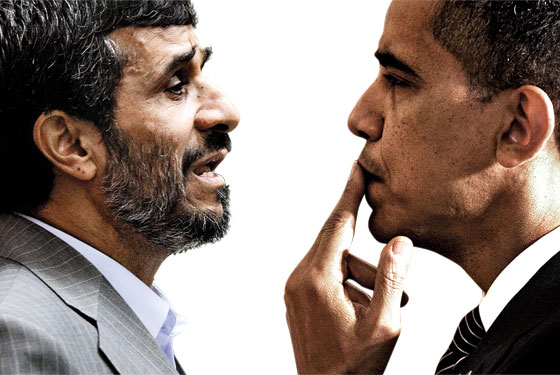
Barack Obama took office with a bold promise of “an extended hand” to Iran. But then came the fraudulent Iranian election and its brutal aftermath, circumstances that made Obama’s challenge more difficult. Obama may now understandably have no appetite for talking to such a patently diabolical regime. (“Told ya!,” cry the Bushies.)
So far, there has been less talk of talking, and more talk of deadlines. Come September, Obama has said, “We will re-evaluate Iran’s posture” toward negotiations. The key date: the start of the new United Nations session on September 15. But don’t expect sincere offers by then from Iran’s Supreme Leader Ayatollah Ali Khamenei or President Mahmoud Ahmadinejad. The two are in a struggle for political survival, ramping up their anti-Americanism to portray reformist critics as foreign stooges. And even if Obama is still willing to talk, Tehran may be too internally divided to serve as a reliable negotiating partner. That’s why White House officials are all but resigned to the futility of direct diplomacy. Former State Department official Nicholas Burns, perhaps the Bush foreign team’s most dovish voice on Iran, predicts that “even if negotiations are held this autumn, they will fail.” And if that happens, administration officials say, Obama will have little choice but to start to clench his own fist.
That means turning the screws on Tehran through what Hillary Clinton has vowed will be “crippling sanctions.” One path runs through the U.S. Congress, where a bill imposing penalties on companies that export refined petroleum to Iran—which despite its own natural reserves has limited refinery capacity—already has 72 Senate co-sponsors and 294 in the House. For now, congressional leaders are just waiting for a green light from the White House before they proceed. The next runs through the United Nations, where Obama will almost surely ask the Security Council to approve international sanctions. That will mean tough negotiations with Russia and China, countries that see Iran more as a trading partner than a security threat. It could also lead to high tensions in the Gulf if Iran acts on threats to cut off oil exports through the Strait of Hormuz, potentially wreaking havoc on the world economy.
But while the work could be slow going, Obama may not have the luxury of time. Although the U.S. State Department estimates Iran may not have weapons grade uranium until 2013, the Israelis believe the line can be crossed within a year. Many former Bush officials believe Israel will launch air strikes against Iran’s nuclear facilities by early next year, according to one former Bush aide. Others, like Burns, doubt the Israelis would take such a destabilizing step. But Tehran clearly hasn’t ruled out the possibility—this month Iran called for an international ban on air strikes against nuclear facilities.